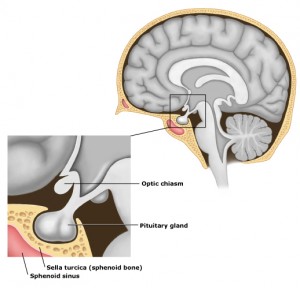Scott Hamilton undergoes surgery for recurrent brain tumor

In an article in People magazine, it was announced that Olympic champ Scott Hamilton underwent brain surgery Wednesday to remove the recurrence of a benign tumor near his pituitary gland. Hamilton’s rep, Michelle Thornbury, told People that the procedure was completed half-way on Wednesday and that “They’re happy with the progress of the entry process, and now [doctors] can begin to get rid of the tumor.” When treated in 2004, Hamilton had a relatively new type of radiation treatment called gamma knife therapy, which is an array of computer controlled radiation beams that pinpoints the tumor. It was not stated whether he is to undergo gamma knife therapy again this time.
He spoke of this experience to the American Association of Neurological Surgeons (AANS) in 2005.
Successfully treated for testicular cancer in 1997, Hamilton was diagnosed in November 2004 with what was called a “benign brain tumor.” He had been complaining of several months of fatigue, headaches and vision problems and was ultimately diagnosed with a slow growing tumor called a craniopharyngioma.
Craniopharyngiomas are tumors derived from pituitary gland tissues, and typically form in area above the pituitary gland. It is most common in children between 5 to 10 years old, and again in individuals over 50. It is fairly uncommon, only occurring in 2 per 100,000 people.
Craniopharyngioma causes symptoms in one of three ways:
- Increasing the pressure on the brain (increased intracranial pressure). This causes symptoms of headache, nausea and vomiting, and decreased balance.
- Disrupting the function of the pituitary gland. This leads to hormone imbalances which can cause growth failure and delayed puberty in children, loss of normal menstrual function or sex drive, increased sensitivity to cold,fatigue, constipation, dry skin, nausea, low blood pressure, and depression. Pituitary stalk compression can lead to diabetes insipidus(DI)- causing increased thirst and urination, and may increase prolactin levels- causing a milky discharge from the breast(galactohrea).
- Damaging the optic nerve causing visual disturbances, and even blindness.
Treatment of craniopharyngioma is either surgical or with radiation, depending on the size and location of the tumor.
For more information:
| Resounding Health(tm) Craniopharyngioma |

























1 Comment